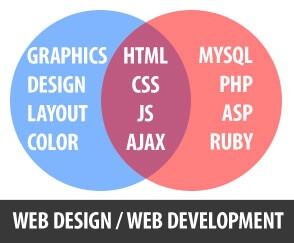Web Developers, What To Know And Why You Should Care!
I will breakdown some experiences that have helped me offer the best level of service to my clients, questions to help clarify the relationship when working with a Web Developer or Web Designer, and more.
It has occurred to me that there are many misconceptions regarding the duties of a Web Developer.
Besides my personal experiences, I’ve also had friends frequently ask, “Is this billable?” As well as misunderstandings of what needs to be paid for “upfront,” how to qualify it, quantify it, set goals, and asking the right questions.
Developers have a tendency to be vague about tangible details, and many businesses do not know the right questions to ask. To no one’s surprise, this often leads to misunderstandings.
I believe this article may answer some of these questions, and I hope, be of value to both businesses and Web Developers.
Grab a tea or coffee, and let’s go!
Due Diligence
Let’s focus on the developer or designer first.
While we all have the best intentions, ask yourself how much due diligence have you done before a proposal as a developer or as a business?
This is not an accusation. I encountered this myself recently.
I heard what my client wanted and needed, but I did not do as much research into the current situation as I should have.
Everything was fine, as the client realized that there were things they should have let me know before we started, and I should have been more diligent.
Regardless, this happens frequently to all of us – not having all the information before we begin collaboration.
One Way to Address Issues Is to Compose A Specific Checklist of Questions for Future Projects.
Questions that I have added to my list for web development, which may help you:
- Can you please walk me through the history of your website or project?
- How many revisions have there been? How many people, or organizations, have worked on the website?
- Do you have any code documentation from previous revisions? May I contact those organizations, or developers, if needed, to help you?
- Can you show specific websites, or examples, of what functionality, design attributes, colors, etc., you want for this project?
- How do YOU define success in a web d
eveloper ? - What can I do to exceed the experiences you have had in the past?
The bottom line, your goal as a web developer, is having the information you need to do the best job possible for your client, whether that is an internal or external party.
Through my own experiences, I’ve found that asking more questions upfront, accessing cPanel’s or other Web consoles, and peeking at the database for “weirdness” are ways to more accurately budget your time, and costs, with your client.
- You should know how many hours it should take to complete the work.
- Are there licenses or services you will need to pay for?
- What are the client’s expectations of you?
- How can both parties’ measure progress and completion.
- In a future article, I will be exploring the measurement aspect of consulting-related businesses.

Is This Billable?
How many times have you asked yourself that as a developer or as a businessperson?
Firstly, there is no definitive answer to this in all circumstances. However, there are some guideposts. Is the work outside the scope agreed upon in your due diligence, and the contract?
For example, I had a client tell me days before completing a project, “I’ve noticed these ‘recent post’ things on a lot of Websites. I want that! I assume that’s part of my project, right?”
I’m sure you have some great examples of your own.
In this case, the client was billable for the work. However, it’s so easy to set up a recent post widget. I used this circumstance to strengthen our relationship by telling my client, “I will add this feature because I want you to be completely happy with this project. However, let’s agree that future requests not in scope will need to be billed.”
All
Now if a client asks you to “add” all the content of their Website, and it was discussed that this is the client’s responsibility, you likely need to have a conversation.
In general, good clients are hard to find. I want to work with clients that “get it.” If I do my due diligence, many “billable” questions can be alleviated.
Tip: Perceptive developers will plan their billable time to include the “little things,” or final changes that take a client from merely satisfied, to exceeding their expectations.
How Are You Being Paid?
The question of “how do I get paid?” is omnipresent among web professionals I know. Firstly, if you are working on larger projects, you should absolutely have a contract and an attorney.
I am not an attorney, nor am I giving legal advice. For my company, most websites I do require a contract
My terms are simple: 50% at project onset and 50% at the halfway mark. Working without being paid in advance is a recipe for disaster. While most businesses have the best intentions, unfortunately, a few do not.
Do not start a project until the 50% is paid, period. Why? If you are going to do business, you must trust each other
Anyone serious about working together on a project knows it’s not free. If the client can’t pay you 50% upfront, run!
There may be strategic projects you take for less than your usual amount to increase your company awareness, but you need compensation for your time and expertize.
As for contracts, it depends on your business risk comfort level. However, I recommend always having a one in place.
Above all, if your client puts an attorney on the phone, do not speak to them without an attorney! Attorneys talk to attorneys.*
Sadly, too many creative professionals and developers are taken advantage of because they are not adequately educated or work without having a contract.
* Please see Mike Monteiro’s – F&^k You, Pay Me below // @Monteiro
Tip: Being paid should be super easy. While there are many options, I use InspirePay.com or PayPal to send invoices and payment requests.
A free service, InspirePay allows you to hook-up multiple payment gateways, including Stripe and PayPal, into a one-stop solution.
What Does A Web Developer Do?
I have been asking this question informally, and have heard some interesting answers. Most importantly, they are seldom true!
To complicate the issue, many of us do a combination of web development, design, SEO, hosting, and more. Importantly, your client must clearly understand what services they are paying.
Who Is Responsible for CONTENT?
I rarely deal with the content, except for my own brands. My responsibility is for the development, functioning, Analytics, and appearance of the Website – but not the content.
It’s the client’s responsibility unless they are paying for content writing. Therefore, always be clear about who “owns” the content role, and never assume.
Who Is Responsible for Updates
Have you worked on a website, and received a call six months later with a client asking why their dashboard looks like a Christmas Tree? I know I have.
Moreover, it’s unusual for clients to have third parties work on their sites. But the client must understand that what other people do is not your responsibility.
I have subsequently changed to managing most of the websites I work on, and in most cases, hosting them too. It’s is mutually beneficial as I can offer excellent, secure hosting services.
Regardless, always discuss updates and maintenance, and use it as a way to offer more value to your clients, if desired
“Can My Niece Play With Your Code? She’s A Genius.”
You may laugh, but I encounter situations like this, and then get the blame! Set the boundaries from the beginning, “Mr. / Ms. Client, you are paying me to do work for you. Please do not let anyone touch the code or access it during the project.”
Importantly, make sure that your clients understand that any work
“My Website Is Missing; What Have You Done?”
Always backup your code! While it is somewhat rare, I have seen clients wipe a site by accident, and yours truly has made the occasional mistake. However, I always have a backup!
Many tools can accomplish this, but please make sure to do it.
Tip: Both Dropbox and Google Drive now offer 2 TB of storage for $10-$12 a month! Cloud backup is cheap.

Why You Should Care?
I saved the best for last!
Both Web Developers and clients should care because many of the issues that arise are because of a lack of communication.
I assume my client is working with me because they believe I can deliver for them, and they like my work.
By making many mistakes, I have learned things that make my life easier today, and improve my relationship with my clients.
In conclusion, I hope some of these ideas help you.
Have a question? Want to share an experience? Curious about my web design offerings?
Contact me below, or check out my portfolio.





